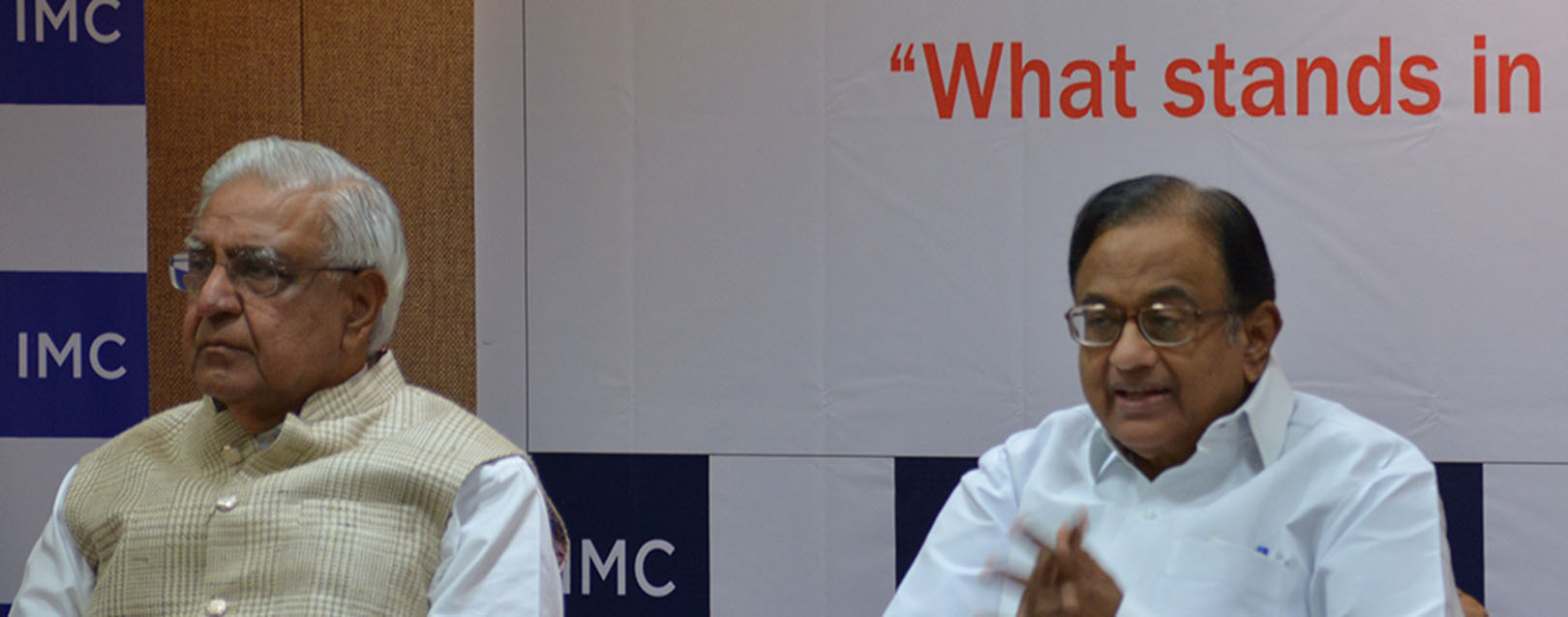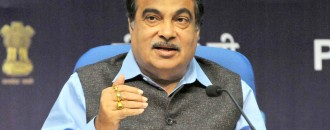
India needs real economic reforms: Chidambaram
Sairaj Iyer
Given the turn of surprising events during the day, there was an air of anticipation and excitement at the meet where former Finance Minister P Chidambaram spoke at length about India's economic growth, demonetization, reforms and taxes, simplifying taxes for commerce, anti-globalization, and many other economic issues and challenges that plague India and other countries.
During the question and answer session, when asked what stood in the way of India's rapid economic growth, he said, in the background of demonetization, Trump's anti-globalization rhetoric, Brexit and sagging exports, 'it is the lack of focus on essential pillars such as taxes, bureaucracy, the creation of jobs and infrastructure'. The former Finance Minister was at his legal best using examples as reference points, making well-thought out analyses and providing a realistic account of facts and figures, during a lecture at the Indian Merchants Chamber in Mumbai.
REFORMS & TAXES
When asked how to distinguish between reforms and economic events, Chidambaram listed 11 steps that he termed as real reforms. According to him, the FTP policy, industrial license abolition, virtual creation of Indian capital market, repeal of MRTP act, reduction in, the 1997 agreement between government and RBI to end ad-hoc treasury bills, disinvestment in public sector enterprises, adoption of PPP model, curbing the state monopoly in telecom, and Aadhar enabled DBTs were the only reforms that could be observed as real reforms. “These were the only 11 steps that I could infer as real reforms, the others were events that we handled as event managers,” he shared.
Explaining further, he said, “Reforms in my lexicon mean inventing or creating a new way of doing things. For example, the GST, the most transformational reform in tax history, is a real reform. The direct tax code to repeal Income tax, Deconstruction of bureaucracies and creation of an ethical society could be real major reforms. Even if we (the current government) set these four (missions) as reforms to be achieved in 24 months (the balance of tenure that the current government has), that could bring about a major transformation in India's economy.”
SIMPLIFYING TAX FOR COMMERCE
Referring to the Constitution of India Chidambaram said that it mandated, “trade shall be free throughout the territory of India”, but free trade is yet to be practiced across the country. In other words, regionalism, trade-factions, and barriers within states such as tolls and taxes constrict free trade within the country. “We have barriers at every state to extract and extort money. GST should look at dismantling every tax entry point, levy, and extortion of money. Otherwise, it would be GST by name alone.”
GST could positively look at promoting free-trade across the country, and PC believed that GST’s implementation could be completed by 1st October 2017, since it would involve an “ironing of issues and work to get revenue services on board”. There would also be time taken to test the system, prove the constitution of the GST network, and enable SMEs to get used to the idea of every transaction being recorded.
The former minister was quite vocal about the working of tax authorities and mooted that there is a dire need for reforms in direct tax code. “The Income Tax Act today is a playground for tax officials and lawyers, and they play a game fully knowing that they are playing a game. Several matches are fixed, and that is how we have a system. No person knows what the tax liability is,” he shared.
Referring to a recent case of a company in India, he said that a direct tax code could prove helpful in avoiding such cases as the one involving this company that successfully evaded in paying Rs. 10,000 crores of tax! Though he did not specifically name the company (CairnIndia) it was implied what he had in mind. He said, “Such mind boggling sums are not the purpose of tax-laws. Tax laws are made to collect legitimate taxes on legitimate profits. The Direct tax code would be a major reform in this country. In my view, all exemptions should go and therefore everybody above a threshold must pay tax. Once you get rid of all exemptions, the law becomes simple and it is only income that must be taxed,” he shared.
ANTI-GLOBALIZATION STANCE
Terming 'anti-globalization' as fashionable since Trump became the President, he cautioned that India should not emulate Trump or Brexit. “Even Trump has started modulating his views. I think it is the turn of the wheel from an anti-globalization perspective. The President of China goes to Davos and speaks for globalization, but the US, (champion for free trade) has a President speaking of a closed economy. The American people would soon realise that if they want to improve their standard of living, then they must import. They will also realise there are not many Americans willing to fit into all the jobs, and many lack certifications or qualifications. Their medical systems would also collapse if there are no Indian or Pakistani doctors treating them,” he said.
Replying to queries comparing China’s slowing economy to that of India's, he said that 'the Chinese GDP is five times that of India’s, and that arithmetic could change very quickly'. Post demonetization, the GDP has receded to 7-7.5% and said that rapid growth to 8% is needed for new investments in infrastructure and creation of jobs. He shared, “surpluses would be generated only when we grow at 8% or more. Otherwise, we will have funds to only maintain roads, and not build new infrastructure. The remaining 24-27 months, given political conditions, we should accelerate and bring reforms that can bring beyond 8% growth,”
The nonchalant finance minister ended the meet with a surprise, praising Prime Minister Modi. When asked about his party's debacle in the UP elections, he quipped “There is one dominant person who arose from the elections"!





